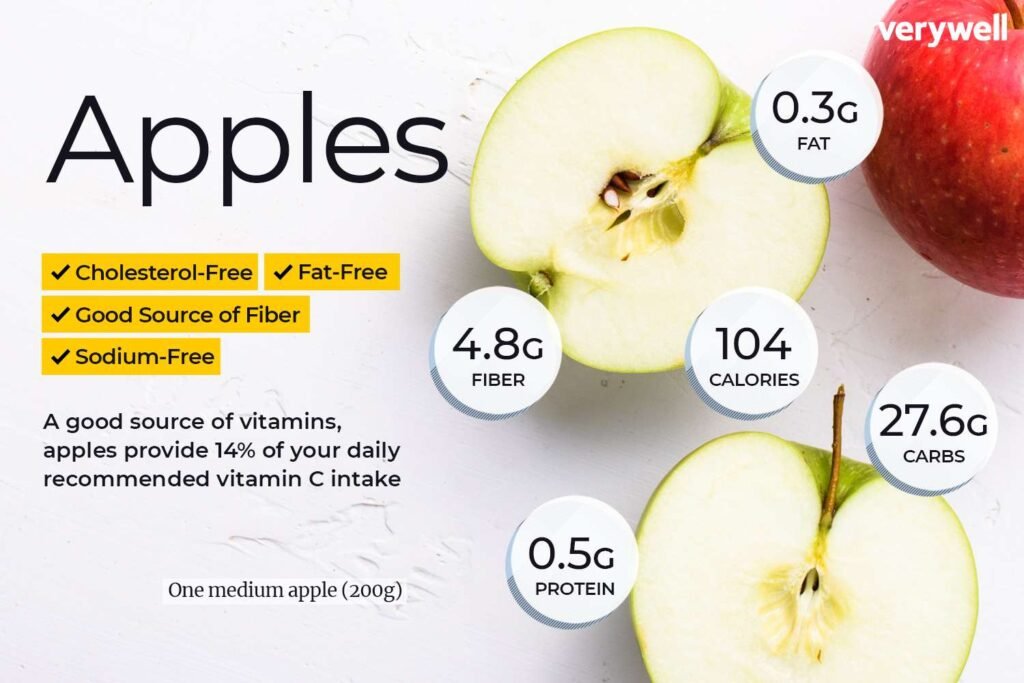
Benefits of Apple Peels
Apple peels offer several health benefits, making them a valuable part of the fruit to consume. Here are some of the benefits of apple peels:
- Dietary Fiber: Apple peels are a rich source of dietary fiber, including insoluble fiber like cellulose and soluble fiber like pectin. Fiber is essential for digestive health, as it helps regulate bowel movements, prevent constipation, and support a healthy gut microbiome.
- Antioxidants: Apple peels contain a variety of antioxidants, such as quercetin, catechin, and epicatechin. These antioxidants help neutralize harmful free radicals in the body, reducing oxidative stress and lowering the risk of chronic diseases like heart disease and cancer.
- Anti-Inflammatory Properties: Some compounds found in apple peels have anti-inflammatory properties. Quercetin, for example, has been linked to reducing inflammation and may help alleviate symptoms of conditions like arthritis.
- Blood Sugar Regulation: The fiber and antioxidants in apple peels can help regulate blood sugar levels. Soluble fiber, in particular, slows down the absorption of sugar, which can be beneficial for people with diabetes or those looking to manage their blood sugar.
- Weight Management: Eating apples with their peels can help with weight management. The fiber in the peels can increase feelings of fullness and reduce overall calorie intake, making it easier to maintain a healthy weight.
- Skin Health: The antioxidants in apple peels may contribute to better skin health by protecting against UV damage and promoting collagen production. Some topical skincare products also use apple-derived ingredients for their potential benefits.
- Heart Health: Regular consumption of apples, including the peels, has been associated with a reduced risk of heart disease. The fiber and antioxidants can help lower cholesterol levels and blood pressure.
- Detoxification: Apple peels contain compounds that support the body’s natural detoxification processes. These compounds can aid in the removal of toxins and heavy metals from the body.
- Cognitive Function: Some research suggests that the antioxidants in apple peels may have a protective effect on brain cells, potentially reducing the risk of cognitive decline and neurodegenerative diseases like Alzheimer’s.
- Immune Support: The antioxidants and other compounds in apple peels may help support the immune system by enhancing the body’s ability to fight off infections and illnesses.
It’s important to note that while apple peels offer numerous health benefits, it’s also essential to wash them thoroughly to remove any pesticide residue and contaminants. If you have allergies or sensitivities, be cautious, as some people may experience skin irritation or digestive discomfort when consuming apple peels. As with any dietary change, it’s advisable to consult with a healthcare professional for personalized advice, especially if you have specific health concerns or conditions.
also read11 Health Benefits of Eating Egg
Side effects of apple peels
side effects of apple peels
Apple peels are generally safe to eat and are well-tolerated by most people. However, in some cases, individuals may experience side effects or discomfort when consuming apple peels. Here are some potential side effects of apple peels:
- Digestive Discomfort: Apple peels are a rich source of dietary fiber, and for some people, consuming a large amount of fiber quickly can lead to digestive discomfort, such as gas, bloating, or diarrhea. It’s advisable to introduce apple peels gradually into your diet if you’re not used to high-fiber foods.
- Allergic Reactions: While rare, some individuals may be allergic to certain compounds found in apples, including proteins in the peel. Allergic reactions can range from mild symptoms like itching or hives to more severe reactions like swelling and difficulty breathing. If you suspect an apple allergy, consult a healthcare professional.
- Pesticide Residues: If apples are conventionally grown, there is a possibility that pesticide residues may be present on the peel. It’s recommended to wash apples thoroughly or choose organic apples to reduce the risk of pesticide exposure.
- Gastrointestinal Sensitivity: Some people may have a sensitive stomach or gastrointestinal conditions, such as irritable bowel syndrome (IBS) or acid reflux, which can be exacerbated by the consumption of apple peels. If you have such conditions, monitor how your body responds to apple peels and adjust your intake accordingly.
- Skin Irritation (Topical Use): When using apple peels for homemade skincare products or treatments, some individuals with sensitive skin may experience mild irritation, redness, or a tingling sensation. It’s essential to perform a patch test before applying apple peel-based products to your face or skin.
It’s important to note that these side effects are relatively uncommon, and most people can safely consume apple peels as part of a balanced diet. However, if you experience severe or persistent symptoms after consuming apple peels, consult a healthcare professional for further evaluation and guidance.
To minimize the risk of adverse effects, you can:
- Wash apples thoroughly to remove potential contaminants.
- Start by consuming a small amount of apple peel and gradually increase your intake if you’re concerned about digestive discomfort.
- Choose organic apples when possible to reduce pesticide exposure.
- If you have known food allergies or sensitivities, be cautious when introducing new foods into your diet and monitor your body’s response.
As with any dietary change or potential allergen, it’s important to listen to your body and seek advice from a healthcare professional if you have specific concerns or experience unusual symptoms.
Apple peel benefits for weight loss
Apple peel benefits for weight loss
Apple peels can be beneficial for weight loss due to several factors:
- Dietary Fiber: Apple peels are an excellent source of dietary fiber, including both soluble and insoluble fiber. Fiber adds bulk to your diet, which can help you feel full and satisfied, reducing the likelihood of overeating. It also slows down the digestion and absorption of nutrients, including carbohydrates, which can help stabilize blood sugar levels and reduce cravings for high-calorie snacks.
- Low in Calories: Apple peels are low in calories, making them a healthy and low-energy-density food choice. Consuming foods with fewer calories per gram can help you control your overall calorie intake, which is essential for weight management.
- Satiety: The fiber and water content in apple peels contribute to a feeling of fullness and satiety. When you feel full, you’re less likely to consume excess calories. Incorporating apple peels into your meals or snacks can help curb your appetite.
- Reduced Snacking: Snacking on high-fiber foods like apple slices with peels can be a satisfying way to curb hunger between meals without resorting to unhealthy, calorie-dense snacks. This can help you stay on track with your weight loss goals.
- Blood Sugar Regulation: The soluble fiber in apple peels, such as pectin, can help regulate blood sugar levels by slowing down the absorption of sugars from the digestive tract. This can prevent spikes and crashes in blood sugar that can lead to cravings for sugary or high-calorie foods.
- Gut Health: The fiber in apple peels also supports a healthy gut microbiome. A balanced gut microbiome has been associated with better weight management and metabolism.
- Nutrient Density: Apple peels contain various vitamins, minerals, and antioxidants that are beneficial for overall health. When you choose nutrient-dense foods like apples with peels, you provide your body with essential nutrients without excessive calories.
It’s important to note that while apple peels can be a helpful addition to a weight loss plan, they should be part of a balanced diet that includes a variety of fruits, vegetables, lean proteins, and whole grains. Weight loss is most effective when combined with a calorie-controlled diet and regular physical activity. Additionally, individual results may vary, so it’s a good idea to consult with a healthcare or nutrition professional to create a personalized weight loss plan that suits your needs and goals.
Apple peel benefits for skin
Apple peel benefits for skin
Apple peels offer several potential benefits for the skin, thanks to their content of various vitamins, antioxidants, and other compounds. Here are some ways in which apple peels can contribute to better skin health:
- Antioxidant Protection: Apple peels contain antioxidants, such as quercetin and catechins, which help protect the skin from oxidative stress caused by free radicals. This protection can help prevent premature aging and reduce the risk of wrinkles, fine lines, and age spots.
- UV Damage Protection: Some studies suggest that the antioxidants in apple peels may have photoprotective effects, helping to shield the skin from UV radiation damage. However, this should not replace sunscreen but can complement sun protection measures.
- Collagen Production: The antioxidants in apple peels may promote collagen production in the skin. Collagen is a protein that maintains skin’s elasticity and firmness, contributing to a youthful appearance.
- Hydration: Apples have a high water content, and this moisture can help keep the skin hydrated. Proper hydration is essential for maintaining healthy skin and preventing dryness and flakiness.
- Skin Brightening: Apple peels may help brighten the skin and even out skin tone. The natural acids in apples, such as malic acid, can have mild exfoliating properties, which may reduce the appearance of dark spots and hyperpigmentation.
- Acne Management: Malic acid, found in apple peels, has astringent properties that can help control excess oil production and improve acne-prone skin. However, it’s important to use apple peels cautiously, as the acids can be too harsh for sensitive or inflamed skin.
- Skin Detoxification: Some compounds in apple peels may aid in the body’s natural detoxification processes, potentially assisting in the removal of toxins from the skin and body.
- Soothing Irritated Skin: The anti-inflammatory properties of certain compounds in apple peels, like quercetin, may help soothe irritated or inflamed skin conditions such as rosacea or dermatitis.
To incorporate apple peels into your skincare routine, you can consider making homemade apple peel masks or scrubs. Keep in mind that apple peels may not be suitable for all skin types, especially if you have sensitive or allergy-prone skin. It’s a good practice to perform a patch test before using apple peel-based products on your face and consult a dermatologist or skincare professional for personalized advice, especially if you have specific skin concerns or conditions. Additionally, a balanced diet that includes a variety of fruits and vegetables can contribute to overall skin health.
Benefits of apple peel powder
Benefits of apple peel powder
Apple peel powder is a convenient and versatile product that offers a range of potential health benefits due to its concentrated form of apple peels. Here are some of the benefits of apple peel powder:
- Rich in Fiber: Apple peel powder is a significant source of dietary fiber, including both soluble and insoluble fiber. This can aid in digestion, promote regular bowel movements, and support a healthy gut microbiome.
- Antioxidants: Apple peel powder contains a variety of antioxidants, including quercetin, catechins, and polyphenols. These antioxidants help combat oxidative stress, reduce inflammation, and protect cells from damage caused by free radicals.
- Weight Management: The fiber in apple peel powder can promote a feeling of fullness and reduce appetite, which may assist in weight management by curbing overeating and promoting satiety.
- Blood Sugar Regulation: The soluble fiber, pectin, found in apple peel powder can slow down the absorption of sugar, helping to stabilize blood sugar levels. This can be particularly beneficial for individuals with diabetes or those looking to manage their blood sugar.
- Heart Health: Regular consumption of apple peel powder may contribute to heart health by reducing LDL (bad) cholesterol levels, lowering blood pressure, and decreasing the risk of cardiovascular diseases.
- Skin Health: The antioxidants in apple peel powder can promote skin health by protecting against oxidative damage, supporting collagen production, and reducing signs of premature aging, such as wrinkles and fine lines.
- Immune Support: The antioxidants and other bioactive compounds in apple peel powder may help strengthen the immune system, making it more effective at fighting off infections and illnesses.
- Detoxification: Some compounds in apple peel powder may support the body’s natural detoxification processes, aiding in the removal of toxins and potentially reducing the burden on the liver.
- Anti-Inflammatory Properties: Apple peel powder contains compounds with anti-inflammatory properties, which can help reduce inflammation in the body and alleviate symptoms of inflammatory conditions.
- Nutrient Dense: Apple peel powder retains many of the vitamins and minerals found in fresh apple peels, making it a nutrient-dense addition to your diet.
- Convenience: Apple peel powder is easy to incorporate into various recipes, including smoothies, baked goods, oatmeal, and more, making it a convenient way to enjoy the benefits of apple peels.
When using apple peel powder, be sure to follow the recommended serving sizes and incorporate it into a balanced diet. As with any dietary supplement, it’s a good idea to consult with a healthcare professional before adding apple peel powder to your routine, especially if you have specific health concerns or conditions. Additionally, choose high-quality, organic apple peel powder to ensure it is free from pesticides and contaminants.
Apple without skin nutrition
Apple without skin nutrition
The nutrition content of an apple without the skin will be somewhat different from a whole apple with the skin intact. Here are the key nutrients typically found in a medium-sized (about 182 grams) apple without the skin:
- Calories: An apple without the skin typically contains around 52-77 calories, depending on its size and variety.
- Carbohydrates: Apples are primarily composed of carbohydrates, with approximately 14-19 grams of carbs per apple without the skin. Most of these carbs come from natural sugars like fructose.
- Fiber: Even without the skin, apples are still a good source of dietary fiber. A medium apple without the skin contains around 2-3 grams of fiber. However, much of the fiber is concentrated in the skin.
- Vitamin C: Apples provide vitamin C, an antioxidant that supports the immune system and skin health. An apple without the skin typically contains 5-7 mg of vitamin C.
- Potassium: Apples are a source of potassium, an essential mineral that helps regulate blood pressure and maintain proper muscle and nerve function. An apple without the skin contains roughly 130-150 mg of potassium.
- Vitamin A: Apples without the skin have a lower vitamin A content compared to the whole fruit, as most of the vitamin A is found in the skin. However, they still contain a small amount of this essential vitamin.
- B Vitamins: Apples contain trace amounts of various B vitamins, including small amounts of B1 (thiamine), B2 (riboflavin), and B6 (pyridoxine).
- Minerals: Apples contain small amounts of minerals like calcium, magnesium, and phosphorus, although the quantities are relatively low.
- Natural Sugars: Apples naturally contain sugars, primarily fructose, which provides the sweet taste. An apple without the skin typically contains 9-13 grams of sugar.
While apples without the skin may have slightly fewer nutrients and less fiber compared to whole apples, they are still a nutritious and low-calorie snack. If you choose to consume apples without the skin, you may miss out on some of the fiber and antioxidants present in the skin, so it’s a good idea to enjoy whole apples when possible to maximize their health benefits.
Conclusion
In conclusion, apples are a nutritious and versatile fruit that offers a wide range of health benefits. Whether you consume them with or without the skin, you can enjoy:
- Dietary Fiber: Apples are a good source of dietary fiber, which supports digestive health, helps with weight management, and stabilizes blood sugar levels.
- Antioxidants: Apples, especially the peels, are rich in antioxidants like quercetin and catechins, which help protect cells from oxidative damage and reduce the risk of chronic diseases.
- Weight Management: The fiber and low-calorie content of apples can aid in weight control by promoting feelings of fullness and reducing calorie intake.
- Heart Health: Regular consumption of apples may improve heart health by lowering cholesterol levels, reducing blood pressure, and decreasing the risk of cardiovascular diseases.
- Skin Benefits: Apple peels, in particular, contain antioxidants that can promote skin health, protect against UV damage, and support collagen production.
- Blood Sugar Regulation: Apples help regulate blood sugar due to their fiber content and the presence of compounds like pectin.
- Immune Support: The antioxidants and nutrients in apples contribute to a strong immune system, helping the body fight off infections.
- Convenience: Apples are a convenient and portable snack that can be easily incorporated into various dishes and recipes.
While the nutritional content may vary slightly between apples with and without the skin, both options offer valuable health benefits. To maximize these benefits, consider enjoying whole apples when possible, but know that apples without the skin can still be a healthy choice. Always consult with a healthcare professional or nutritionist for personalized dietary advice and recommendations based on your specific health goals and needs.
FAQs
Here are some frequently asked questions (FAQs) about apple peels:
1. Are apple peels safe to eat?
- Yes, apple peels are safe to eat, and they are often consumed as part of the whole fruit. However, it’s important to wash them thoroughly to remove any pesticide residue and contaminants.
2. Can I eat apple peels if I have allergies?
- Some individuals may experience skin irritation or digestive discomfort when consuming apple peels. If you have allergies or sensitivities, it’s advisable to be cautious and consult with a healthcare professional.
3. Are apple peels a good source of nutrients?
- Yes, apple peels are a good source of dietary fiber, antioxidants, vitamins (like vitamin C), and minerals. They contribute to the overall nutritional value of the fruit.
4. Do apple peels have more antioxidants than the flesh of the apple?
- Yes, apple peels tend to have a higher concentration of antioxidants compared to the flesh. Compounds like quercetin and catechins are more abundant in the peel.
5. Can apple peels aid in weight loss?
- Apple peels can contribute to weight loss because they are high in dietary fiber, which promotes a feeling of fullness and helps control calorie intake. However, weight loss results depend on overall dietary habits and lifestyle.
6. Do apple peels have any potential side effects?
- While apple peels are generally safe to eat, some people may experience digestive discomfort if they are sensitive to certain compounds. It’s essential to listen to your body and consume them in moderation.
7. Can I use apple peels in cooking or recipes?
- Yes, apple peels can be used in various recipes, such as apple crisps, pies, jams, and as an ingredient in smoothies. You can also make apple peel tea or use them to add texture and nutrition to salads.
8. Are there any specific health benefits associated with apple peels?
- Yes, apple peels are associated with various health benefits, including improved digestion, reduced risk of chronic diseases due to their antioxidant content, and potential support for weight management.
9. Can I buy apple peel powder or supplements?
- Yes, apple peel powder and supplements are available in some health food stores or online. However, it’s essential to choose reputable products and follow recommended serving sizes.
10. Can I use apple peels for skincare?
- Some people use apple-derived ingredients or apple peel extracts in skincare products for potential skin benefits. However, it’s essential to follow product instructions and consult with a dermatologist for specific skin concerns.
These FAQs provide information about apple peels, their safety, nutritional value, and potential benefits. Always consult with a healthcare professional or nutritionist if you have specific dietary or health concerns related to apple peels.
https://fdc.nal.usda.gov/fdc-app.html#/food-details/171689/nutrients
also read aboutHealthy Skin Care Tips: Achieving Radiant Skin Naturally






